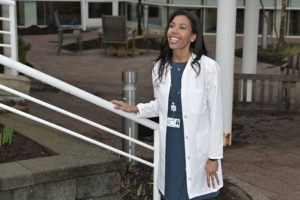
By day, Gizelka David-West, M.D., is a gynecological oncologist at Northern Westchester Hospital in Mount Kisco and Phelps Hospital in Sleepy Hollow. But her side gig is as female lead singer with the band N.E.D. (No Evidence of Disease), which has five albums of infectious (pun intended) pop-rock tunes. As the name implies, the five members are all physicians, specializing in gynecological oncology.
“ ”˜No evidence of disease”™ is what we hope to tell (cancer) patients,” said David-West.
That, however, is not always the case. About 100,000 women will be diagnosed each year with one of the five gynecological cancers ”“ uterine, cervical, ovarian, vulvar and vaginal, with uterine, cervical and ovarian being more prominent and vulvar and vaginal being rare, she said. And while ovarian cancer is particularly deadly, because it”™s so insidious ”“ by the time it”™s discovered it”™s often far advanced ”“ “uterine, the most common of the five, is creeping up,” she added. That”™s because of American society”™s obesity ”“ causing chronic inflammation that stresses the body”™s cells and spurring fat cells to convert steroids to estrogen, high levels of which are associated with increased risk of breast, uterine and possibly ovarian cancers.
Apart from a Pap smear done in a gynecologist”™s office to test for cervical cancer and the HPV vaccine given to young people ages 9 through 26 to prevent the human papillomavirus and thus most cervical cancers, there are no screenings and vaccines for gynecological cancers. Signs of gynecological cancer include unusual bleeding premenopausal and bleeding one year after menopause. Lumps on the vulva or in the vagina can also be an indication of those cancers.
Other symptoms, in particular of ovarian cancer ”“ such as bloating, a feeling of fullness too soon after eating, problems with urination, constipation ”“ can be trickier.
“We all have these from time to time,” David-West said. “But if any of these are persistent, you should see an internist and a gynecologist.”
Regardless, women should see a gynecologist annually, she added, eat a high protein, low-sugar diet, exercise regularly and know their family history. (Tennis star Chris Evert discovered her own ovarian cancer early, thanks to a posthumous test on the blood of her sister, Jeanne Evert Dubin, who died of ovarian cancer in 2020. The test revealed a harmful variant of the BRCA1 gene that puts women at risk for breast and ovarian cancer. Chris Evert ”“ who learned she also had fallopian-tube cancer, a rare disease ”“ underwent a hysterectomy and chemotherapy and has been given a 90 to 95% chance that the cancer won”™t return.)
As for hormone replacement therapy ”“ which alleviates the severe side effects of menopause but can put patients at risk for breast cancer, blood clots, heart disease and stroke ”“ David-West said, “it”™s all about balance. Everything in moderation.”

The balance between science and music has been part of David-West”™s life since childhood. She grew up in a Nigerian-Slovakian family of artists, first in Nigeria and then in New York City, where, David-West said, “I saw myself ending up on Broadway.” The mezzo-soprano studied voice at Fiorello H. LaGuardia High School of Music & Art and Performing Arts. But she also loved biology, and her father suggested she major in biology and do music on the side, the right decision, she said.
She graduated from Eastern New Mexico University, where her father chaired the visual arts department ”“ “one of the nice things about having a parent who”™s an academic is you get to go to college for free,” she said ”“ and received her M.D. from the University of Miami Miller School of Medicine. She did her residency in obstetrics and gynecology at what is now the Icahn School of Medicine at Mount Sinai and her fellowship in gynecologic oncology at NYU Lagone Medical Center, both in Manhattan.
But David-West ”“ who lives in Yorktown Heights with husband Patrick Flynn, a lab technologist at Westchester Medical Center in Valhalla, and their three young children ”“ didn”™t forget music. In 2019, she joined N.E.D., which includes John Boggess, M.D., on vocals and guitar; Robert Burger, M.D., on bass; Nimesh Nagarsheth, M.D., on drums and percussion; and William Winter, M.D., on guitar. Boggess and Winter write the songs, with the rest of the band collaborating on their arrangements.
Before Covid, the band was extremely active, she said, with 10 shows ranging from Alaska to the South. When she joined, they did four shows before Covid struck. Now N.E.D. is getting back on the road, playing an Oct. 1 gig at The Cutting Room in Manhattan. To prepare, N.E.D. ”“ whose members live across the country ”“ got together to rehearse in April and two days before the show, David-West said. Much of their musical work is done virtually, with band members exchanging recorded parts and blending their sounds. Indeed, blending ”“ particularly her voice with Boggess”™ as leads ”“ is key, she said, to why she joined the band and why it works.
“Music is one of the universal languages,” said David-West, who is also fluent in Spanish. “So many people can connect with it.”
In the operating room, she connects to music, too, in the background ”“ something that”™s easy on the ears but not too easy.
“I don”™t want anything slow and sleepy,” she said.



















